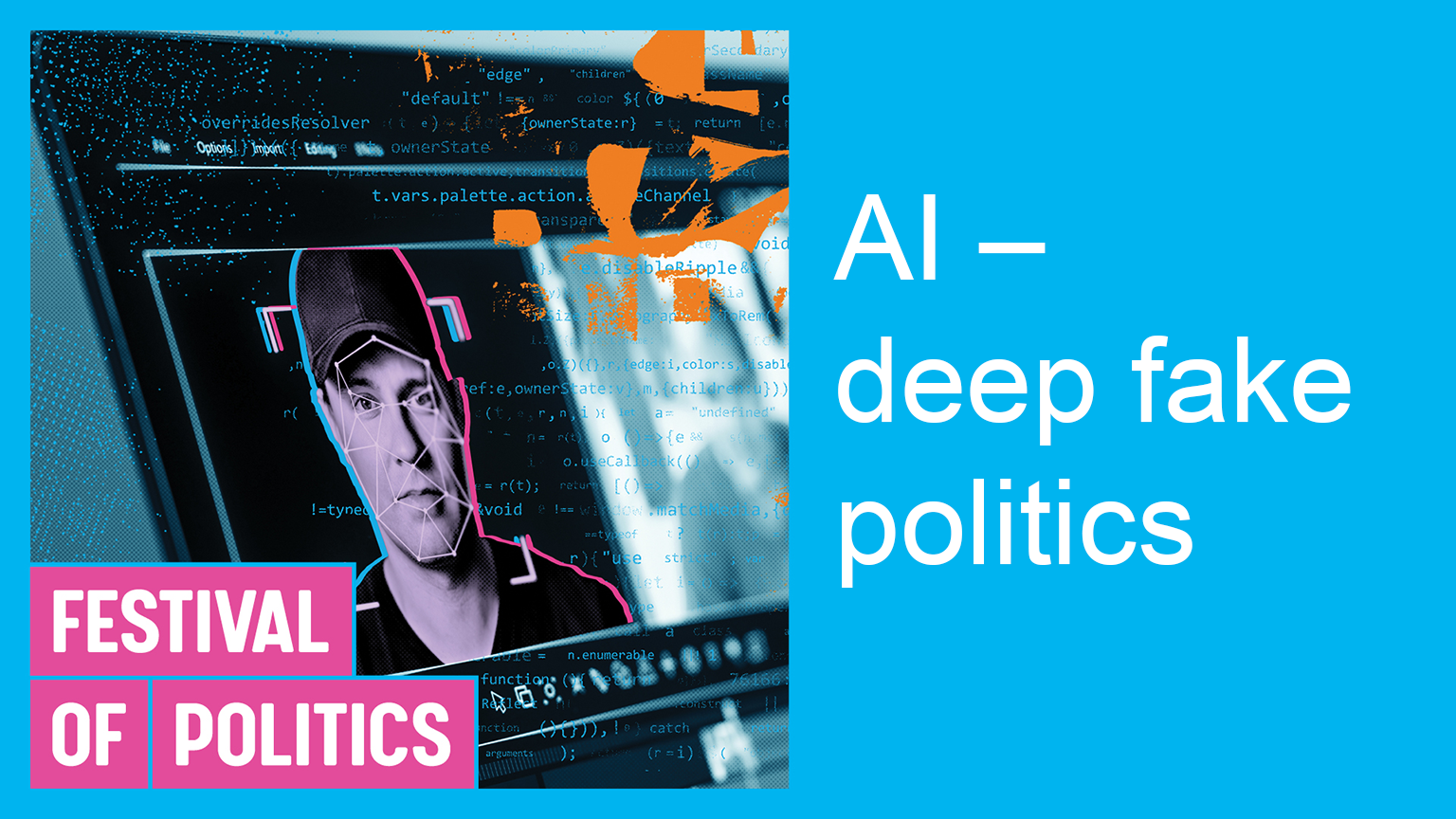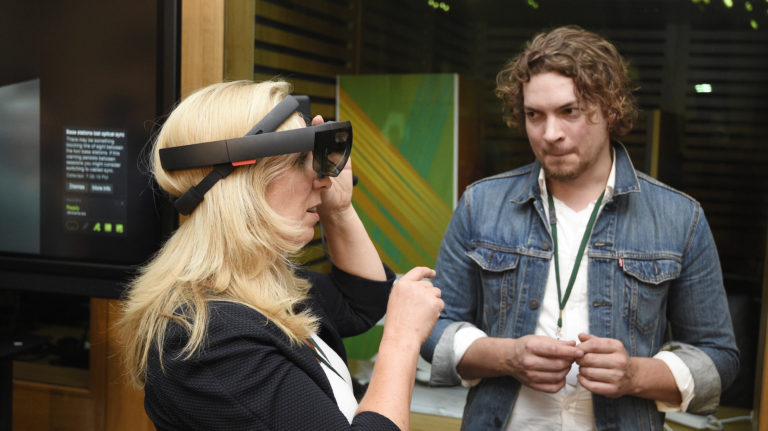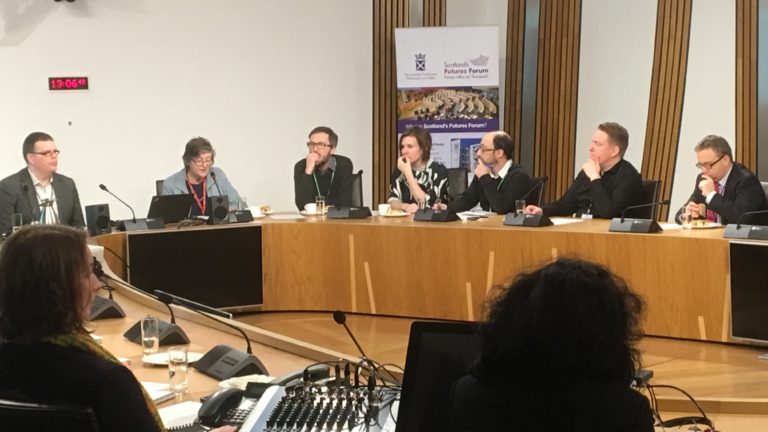AI – Deepfake Politics
Friday 23 August 2024, at the Scottish Parliament
Part of the 2024 Festival of Politics, this panel discussion explored the challenges and opportunities artificial intelligence (AI) and deepfake technology present to democracies. The panel included experts discussing the implications of AI, misinformation, the urgent need for collaborative solutions and the responsibilities of citizens, government and tech companies.
Key Takeaways
- Deepfake technology, while innovative, poses significant threats to democracy, particularly through disinformation and its ability to undermine trust in political institutions.
- AI tools can be misused for malicious purposes, including the spread of non-consensual content and election manipulation.
- Education and digital literacy are crucial to combating AI misuse.
- Regulation of AI and social media platforms must be anticipatory, adaptive, and focused on transparency and accountability.
- Building trust in institutions is essential for countering disinformation and maintaining a healthy democracy.
Summary
Understanding Deepfakes
The session began with a demonstration of deepfake technology as the Chair, Maggie Chapman MSP, made an on-screen introduction to the event, speaking in several languages that she does not speak. The panel explained deepfake technology, which allows anyone to fabricate realistic audio, video, or images. Once a complex process requiring significant resources, advancements in AI technologies have made deepfakes accessible to the public. While some uses are positive, such as enabling multilingual political engagement, the technology’s ease of use raises concerns about its exploitation for harmful purposes.
Concerns have been raised about the spread of non-consensual explicit material, particularly targeting women and minorities. This has led to new legislation in the UK. The panel emphasised that the growing prevalence of deepfakes poses unique challenges for democracy and public trust regarding information consumed online.
Current Use of Deepfakes in Politics
Deepfake technology has already begun appearing in political contexts worldwide. While its direct influence on elections in the UK has so far been limited, the panel agreed that the potential for misuse – particularly in future campaigns – is immense. The ability to generate convincing, fabricated content can exacerbate divisions, spread false narratives, and create confusion. This raises ethical questions about trust and engagement in democratic processes. For example, state actors may utilise deep fakes to sow discord and manipulate information.
Impact on Trust and Public Discourse
Beyond direct harm, deepfakes contribute to a broader decline in trust in political institutions, media, and public discourse. The panel noted that when misinformation becomes pervasive, the very concept of truth can be undermined, harming democracies. AI and disinformation campaigns often succeed by amplifying pre-existing societal beliefs and exploiting information vacuums.
Regulatory Challenges
Panellists discussed the varying state of regulation across the world. For example, in the US AI regulation occurs primarily at the state level due to a lack of action at the federal level. Meanwhile the EU has begun implementing stronger regulations, including potential penalties for misinformation.
Future Directions and Solutions
The panel outlined strategies to mitigate the risks of AI and deepfakes:
Regulation and Accountability
- The discussion underscored the collective responsibility of governments, businesses, and individuals in tackling AI-related threats. Institutions must lead with strong ethical frameworks, clear regulations, and investment in trust-building measures.
- AI regulation remains complex and slow-moving. The panel stressed the need for anticipatory regulation that can adapt to rapidly evolving technology. Transparency requirements were identified as potential solutions. Social media platforms must also take greater responsibility for moderating harmful content and adjusting algorithms that amplify disinformation.
- Addressing AI-related challenges requires societal shifts, including fostering trust in credible gatekeepers, such as independent media and authoritative institutions. The panel emphasised that trust must be earned through transparency, ethical conduct, and better communication.
Personal responsibility
- Personal responsibility for evaluating the authenticity of information was also highlighted. Citizens have a vital role to play by becoming more informed, digitally literate consumers of information.
- The need to foster a culture of scepticism and critical thinking around media consumption was also emphasised.
Conclusion
The panel discussed both the profound risks and opportunities presented by AI and deepfake technology. While these tools have the potential to transform political communication and engagement, their misuse can erode trust, amplify societal divisions, and undermine democratic process. The discussion highlighted the necessity for collaborative efforts among citizens, governments, and tech companies, to navigate the complexities posed by deep fakes and AI in politics. A focus on education, regulation, and ethical practices is crucial for safeguarding democratic integrity.
This summary was generated by artificial intelligence. It may contain errors or inaccuracies, and should not be relied upon as a substitute for professional advice. If you find any content that is offensive or discriminatory, please report it to us.
Watch the Recording
Panellists

Jason Boxt is a Partner at RXN Group in Washington DC. He has worked in public affairs and opinion research for more than 20 years, with expertise in communications and digital research, reputation and brand management, campaign and message development, political strategy.

Robert Moran is a Partner at the Brunswick Group, a critical issues advisory firm. Robert is a management consultant, communications strategist, futurist, and writer. His new novel is Lincoln 2.0, which explores a near future of AI candidates.

Hannah Perry is a lead researcher in the tech policy team at Demos-the cross-party think-tank focused on putting people at the heart of policymaking. She is interested in how democratic systems, institutions and cultures evolve in a digital age and passionate about enabling inclusive environments







